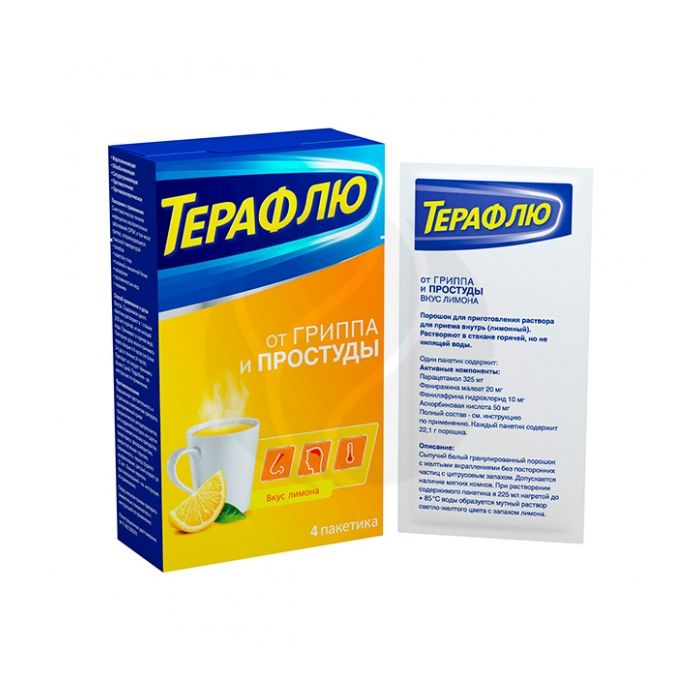Teraflu Lemon powder, No. 4
Expiration Date: 11/2025
Russian Pharmacy name:
Терафлю Лимон порошок, №4
Infectious and inflammatory diseases - influenza, ARVI ('cold'), accompanied by high fever, chills and fever, headache, runny nose, nasal congestion, sneezing and muscle pain.
Inside. The contents of the sachet are dissolved in 1 glass of boiled hot water. It is consumed hot. You can add sugar to taste. A repeated dose can be taken every 4 hours (no more than 3 doses within 24 hours). TeraFluЃ can be used at any time of the day, but the best effect is obtained by taking the drug before bedtime, at night. If there is no relief of symptoms within 3 days after starting the drug, you should see your doctor.
Active ingredients:
Paracetamol 1000.0 mg
Ascorbic acid 100.0 mg
Phenylephrine hydrochloride 12.2 mg
Excipients: sucrose 1936 mg, sodium citrate 501 mg, citric acid 812 mg, acesulfame potassium 65 mg, aspartame 25 mg, quinoline yellow dye 1 mg, lemon flavor 875928 30 mg, lemon flavor 87A069 240 mg, lemon flavor 875060 240 mg, lemon flavor 501.476 AP0504 40 mg. '
Concomitant use of tricyclic antidepressants, monoamine oxidase (MAO) inhibitors, beta-blockers;
portal hypertension;
alcoholism;
diabetes;
pregnancy and the period of breastfeeding;
children under 12 years of age;
hypersensitivity to individual components of the drug.
With caution: with severe atherosclerosis of the coronary arteries, with arterial hypertension, angle-closure glaucoma, severe liver or kidney disease, prostatic hyperplasia, blood diseases, deficiency of glucose-6-phosphate dehydrogenase, congenital hyperbilirubinemia (Gilbert's, Dubin-Johnson's syndrome), hyperplasia and Rothera , pheochromocytoma, bronchial asthma.
TERAFLU WITH LEMON TASTE for flu and colds in an economical package with the benefit of 3 sachets *. Powder for preparation of solution for oral administration is intended for the symptomatic treatment of infectious and inflammatory diseases (ARVI, including influenza), the manifestations of which are:
Х High fever
Х Chills
Х Body aches
Х Headache and muscle pain
Х Runny nose
Х Nasal congestion
Х Sneezing.
* Compared to a pack of 4 sachets when calculating the cost of a pack based on the price of one sachet in packs of 4 and 14 sachets. The comparison uses the average shelf price of 4 and 14 sachets (Proxima, February 2019) and an estimated retail price of 14 sachets. Actual POS prices may vary.
The combined preparation has antipyretic, decongestant, analgesic and anti-allergic effects.
Side effect
Possible allergic reactions (skin rash, itching, urticaria, angioedema), increased excitability, sleep disturbance, decreased speed of psychomotor reactions, drowsiness, dizziness, nausea, vomiting, stomach pain, palpitations, increased blood pressure, dry mouth, paresis of accommodation , increased intraocular pressure, urinary retention.
With prolonged use in high doses, hepatotoxic effect, disturbances in the blood picture (anemia, thrombocytopenia, agranulocytosis), nephrotoxicity.
Application during pregnancy and lactation
Contraindicated during pregnancy and lactation.
Application for violations of liver function
With care: severe liver disease.
Application for impaired renal function
With care: severe kidney disease.
Application in children
Contraindicated in children under 12 years of age.
Overdose
Nausea, vomiting, pain in the epigastric region, hepatotoxic and nephrotoxic effects, in severe cases - liver failure, hepatonecrosis, increased activity of 'hepatic' transaminases, increased prothrombin time, encephalopathy and coma.
Treatment: gastric lavage, intake of activated charcoal, symptomatic therapy. The introduction of methionine after 8-9 hours after an overdose and acetylcysteine ??- after 12 hours. You should seek medical help.
Drug interactions
Enhances the effects of MAO inhibitors, sedatives, ethanol. The risk of hepatotoxic action of paracetamol increases with the simultaneous administration of barbiturates, phenytoin, carbamazepine, rifampicin, zidovudine and other inducers of liver microsomal enzymes.
Antidepressants, antiparkinsonian drugs, antipsychotics, phenothiazine derivatives - increase the risk of urinary retention, dry mouth, constipation. Glucocorticosteroids increase the risk of developing increased intraocular pressure.
Paracetamol reduces the effectiveness of uricosuric drugs and increases the effectiveness of indirect anticoagulants.
Tricyclic antidepressants enhance the sympathomimetic effect, the simultaneous administration of halothane increases the risk of ventricular arrhythmia. FROM
Reduces the hypotensive effect of guanethidine, which, in turn, enhances the alpha-adrenostimulating activity of phenylephrine.

